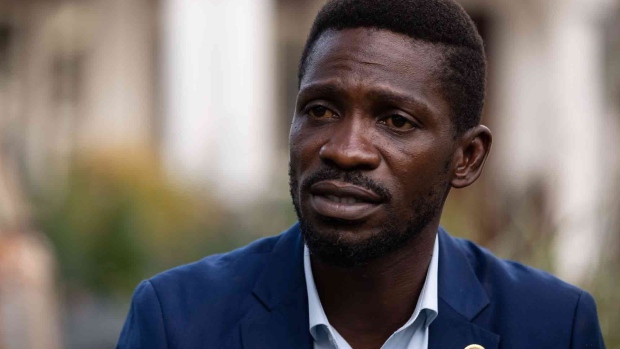Jan 18, 2021
Bobi Wine Faces Uphill Slog to Overturn Ugandan Election Outcome
, Bloomberg News

(Bloomberg) -- Ugandan opposition leader Bobi Wine, who’s been confined to his home since a disputed election, faces a daunting challenge as he seeks to overturn President Yoweri Museveni’s victory.
Results released Saturday showed Museveni won another five-year term with 58.6% of the votes cast and Wine, a pop star-turned politician whose real name is Robert Kyagulanyi, secured 34.8%. Wine’s National Unity Platform party says the official tallies differed from its own, and it will contest the outcome -- which it alleges was rigged.
Filing a court challenge could prove difficult with Wine under the close watch of the military and police at his home in the capital, Kampala, and access to his staff and lawyers restricted. The security forces had also raided the NUP’s Kampala offices and denied its personnel access, Wine said on Twitter.
“They are doing whatever they can to disrupt our plans to go to court,” Fred Nyanzi, Wine’s brother and an NUP official said by phone on Monday. “Disruption has become the order of the day.”
The opposition will also struggle to mobilize popular support for its challenge because social media -- its main form of communication has been shut down since the day before the Jan. 14 vote on the government’s orders.
Wine, 38, presented himself as a youthful alternative to the 76-year-old president, who’s been in power since a 1986 coup and has now won six straight elections. The musician’s campaign pledges included restoring the rule of law, respect for human rights and tackling corruption.
The U.S. and European Union raised concern that the lead-up to the vote didn’t lend itself to a free and fair vote, and didn’t send observer missions. The Uganda Human Rights Initiative, which did monitored the election, said it may not pass the test of credibility. At least 54 people died following riots that erupted after Wine’s arrest in November.
Ugandan authorities have previously derailed opposition attempts to challenge election results. The Forum for Democratic Change’s Kiiza Besigye was arrested and his party’s offices raided shortly after the 2016 vote, which Museveni won, and he failed to file a planned court challenge, in part because some of the evidence was stolen.
‘Under Seige’
“There is no way you can prepare for a court process when you are under siege,” said Godber Tumushabe, an associate director at the Kampala-based Great Lakes Institute for Strategic Studies. “The process requires a high degree of movement and freedom. You must be able to freely interact with your lawyers.”
Security officials were deployed to Wine’s home to guard him because he was a presidential candidate and their numbers will be scaled down following a proper assessment, the Kampala-based New Vision newspaper reported, citing the army’s deputy spokesman.
Africa’s biggest-coffee exporter, Uganda is due to begin exporting oil starting 2024. The implementation of about $20 billion of associated projects, including a transnational pipeline and a refinery, hinges on political stability -- which could be undermined if the opposition calls for protests.
Unrest in Uganda could also have ramifications beyond its borders given its role in peace and security in the Great Lakes region. Uganda contributed the highest number of troops to the African Union peace-keeping mission in Somalia and hosts more refugees than any other African nation.
Museveni described the election as the most credible since Uganda won independence from Britain in 1962 and vowed to avoid a repeat of the November protests, which he said had taken the police by surprise.
But in his Twitter posting, Wine accused Museveni of “the most vile election fraud in history” and resorting to the “most despicable forms of intimidation.”
©2021 Bloomberg L.P.


